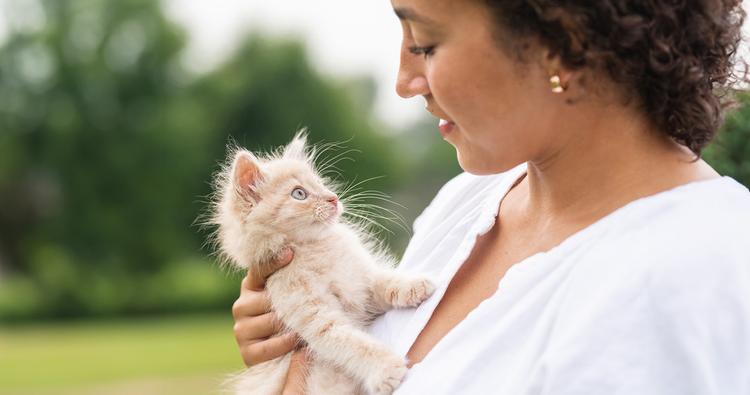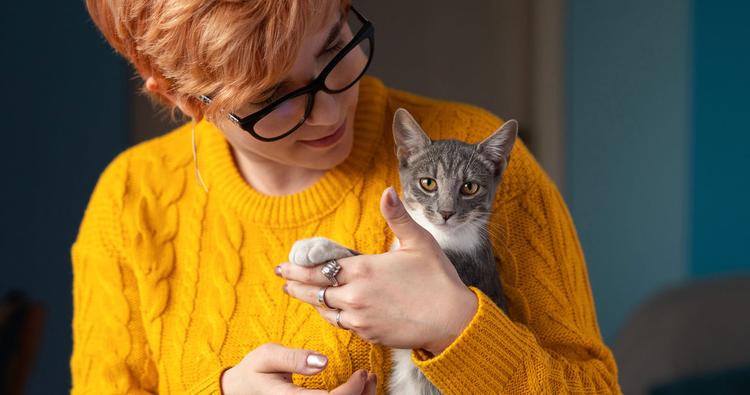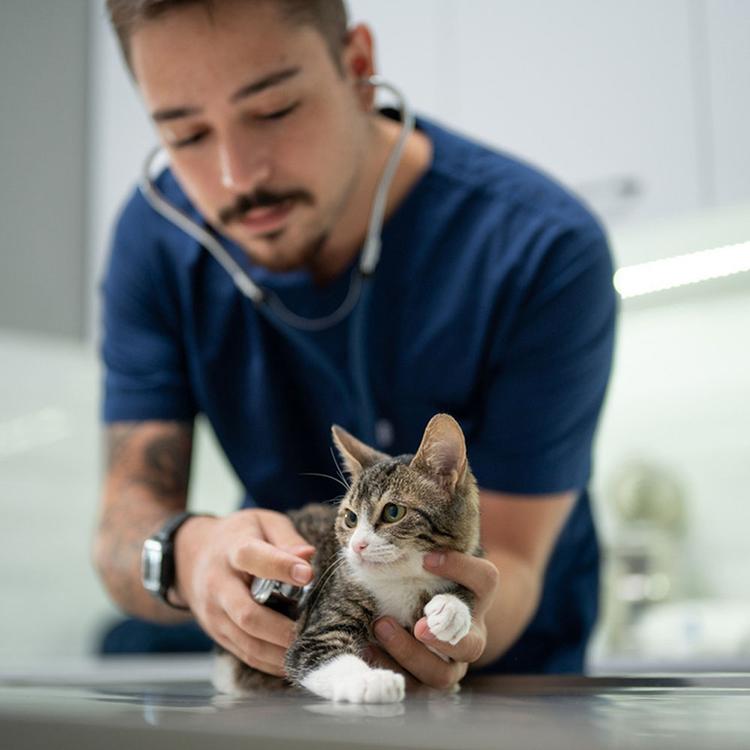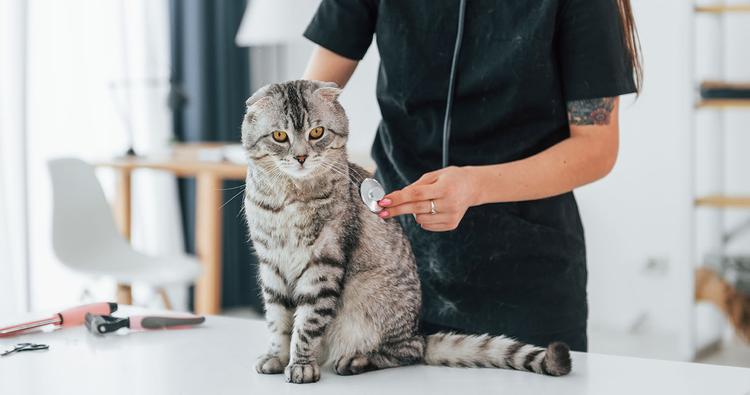Cat Health: How to Take Care of Your New Kitten’s Health Needs
Your guide to everything you need to know — because preventing kitten health problems is far less expensive (and easier) than treating illnesses
Your guide to everything you need to know — because preventing kitten health problems is far less expensive (and easier) than treating illnesses
by Adrienne A. Kruzer, BBA, RVT, LVT, | April 5, 2024

Demetr White / Stocksy
As a kitten parent, it’s important to be aware of common kitten-health issues to prevent as many of them as possible, and to quickly recognize any signs of illness. Kittens are vulnerable to many illnesses that will require prompt attention — like infectious diseases, parasites, and gastrointestinal issues.
When compared to kittens that go outside, indoor kittens may be at a lower risk of developing certain health problems. But neither indoor or outdoor kittens are completely free from potential illnesses. Common kitten-health problems should be on every pet parent’s radar, so they can not only do their best to keep their kitten healthy, but also know when to get them the help they need.
If you want to know how to take care of a new kitten, start with your veterinarian — all new kittens should visit a veterinarian. And all new pet parents should discuss topics such as vaccinations, deworming treatments, and parasite preventatives with a veterinarian to determine what their individual kitten requires. Starting off your kitten right with a health check can help set the tone for the rest of their life.
At your kitten’s initial health check, you and your veterinarian should talk about core vaccinations. Additionally, you should both discuss other kitten-health problems that may or may not have vaccines, but are important to be aware of. Some of these include...
Feline panleukopenia is also known as FPV, feline distemper, feline infectious enteritis, and parvo. In cats, it is a very contagious, yet preventable, disease that leads to very low white-blood cell counts and can cause diarrhea, vomiting, sepsis, and dehydration. This disease can spread quickly and survive in the environment for more than a year without proper disinfecting. Thankfully, a vaccination is available for feline panleukopenia, so it is preventable.
There are a number of viruses and bacteria — some of which there are vaccines for — that can cause upper-respiratory infections (URIs) or feline upper-respiratory disease complexes (URDs) in kittens. These include the feline herpesvirus (also known as FeHV-1, feline viral rhinotracheitis or FVR), feline calicivirus, Bordetella bronchiseptica, and Chlamydophila felis. Symptoms such as coughing, sneezing, a runny nose, weeping eyes, nasal congestion, wheezing, inflamed conjunctiva around the eyes, a decrease in appetite, and lethargy can indicate that your kitten has an upper respiratory infection.
Unlike most of the other kitten-health concerns with vaccines, feline immunodeficiency virus (FIV) is one disease that your kitten can actually be born with. This disease can be passed from mother to kitten in utero, from blood, or through saliva after birth. Your veterinarian will likely test your new kitten for FIV at their first health check. They may also recommend your kitten be vaccinated against the disease if they are going to be outdoor cats, or if they are exposed to cats already known to be infected with the virus. FIV-positive cats can live normal lives, but are more susceptible to infections due to their compromised immune systems. They are also more likely to develop dental issues, so your veterinarian will likely stress the importance of kitten oral health.
Similarly to FIV, kittens can contract the feline leukemia virus (FeLV) in utero from their mothers. But they can also become infected from exposure to the virus from grooming, sharing dishes and litter boxes, and while nursing from an infected cat. Your veterinarian may test your kitten for FeLV and recommend they be vaccinated if they are going to be an outdoor cat. This virus causes immune issues and almost always results in fatality. Symptoms such as pale gums, a decrease in appetite, and weight loss may indicate your kitten is infected.
Kittens commonly get intestinal parasites that are referred to as worms, but they can also get mites, fleas, heartworms, and ticks. These various parasitic infestations can cause anemia, unthrifty hair coats, diarrhea, a pot-bellied appearance, itching, vomiting, weight loss, dark ear debris, coughing, blood in the stool, and even more symptoms depending on the type of parasite. Thankfully parasites are easily prevented with environmental management and monthly preventative medicines.
It’s not uncommon for a kitten to develop gastrointestinal issues, especially as their diet transitions from milk to kitten food, or from kitten food to adult-cat food. In addition to dietary changes, kittens may eat things they shouldn’t eat. Vomiting and diarrhea are symptoms to watch-out for and may require veterinary treatment.
Some newborn kittens unfortunately don’t survive past weaning age, due to a variety of factors. Kittens that pass away shortly after birth may have fading kitten syndrome (FKS), a health concern that can include congenital issues, infections, malnourishment, and other things.
Your kitten needs to visit a veterinarian for an initial health check and will likely need to make a few return visits until all their initial vaccinations and dewormings are completed. After you take these preventative measures, your new kitten won’t need to see a veterinarian for a year, unless you suspect they have a health issue. Make sure your kitten is eating, drinking, and using their litter box normally, and watch for any symptoms (detailed in “Common kitten health problems,” above).
Even if your kitten is an indoor-only cat, if they are exhibiting any lethargy, aggression, vomiting, straining in the litter box, or other abnormal behaviors, you should take them to your vet. Getting pet insurance, or starting to save for pet emergencies while your kitten is young, can help you manage unexpected vet visits.
Indoor cats may not be exposed to the same kinds of dangers as outdoor cats, but there are still things cat parents should do to help them stay healthy.
Ensure your cat’s vaccinations are up-to-date: After the initial series of shots for kittens, cats will still need vaccinations every one year or three years, depending on the type of vaccination.
Provide a balanced diet: Whether or not you feed your kitty dry kibble, raw food, canned food, or homemade meals, their diet should be formulated by a veterinary nutritionist to ensure it contains all the essential nutrients your cat needs.
Groom your cat often: Regular brushing is a must, even if your cat has short hair. It not only helps to remove dead fur, but it is also a good bonding opportunity. Additionally, ear-cleaning, tooth-brushing, and the occasional bath (if your cat gets dirty) are important.
Spay or neuter your cat: Spay-neuter procedures can prevent overpopulation issues, decrease your cat’s cancer risks, and prevent unwanted behaviors in them.
Create a safe and stimulating environment: Cats need plenty of things to play with, climb on, and scratch. But they also need their environments to be free of toxic plants and substances, electrical cords that can be chewed, and other dangers.
You can expect indoor cats to live into their late teens or early twenties. They typically live longer than outdoor cats, because they are not at risk of: being hit by a car, getting into fights with wild or stray animals, contracting diseases and parasite infections, and coming into contact with certain toxins and extreme environments.
Indoor cats have much more controlled environments, so you can better monitor them for health concerns and get them medical attention sooner. Regular, preventative veterinary care will also help your indoor cat reach their full life expectancy.
Yes, they absolutely do. Physical examinations and routine diagnostic tests allow your veterinarian to detect health concerns early on, which increases the likelihood of a treatment being successful. If you only bring your cat to see a veterinarian when they are sick, it is possible that a disease can progress to the point of being less treatable (or even worse, untreatable). Just like with humans and their doctors, a vet can detect an illness in a cat well before visible symptoms or other abnormalities occur.
Flea, tick, heartworm, and intestinal-parasite preventatives are often given to cats each month. (Some medication only needs to be given to your cat once every three months.) Also, some prevent multiple kinds of parasites, and others only prevent one type of parasite. These medications can be delivered in a topical form through a collar, in a liquid that gets absorbed through the skin, or in an oral form through a pill or tablet.
Note that both outdoor and indoor cats are at risk for parasite infections — primarily due to other animals and insects (outdoor cats), and fleas, mosquitoes, and mice (indoor cats). Left untreated, parasites can cause serious issues, including anemia and even death.

Adrienne Kruzer is an accomplished veterinary technician and writer with over 15 years of hands-on experience caring for domestic and exotic animals.

Adoption Advice

Adoption Advice

Adoption Advice

Shelters & Rescue

Adoption Advice
Preparing for a kitten’s first vet visit. Learn about what you can expect from a vet visit and what you should do to ensure it goes smoothly.

Adoption Advice
Here’s what you should know about cat vaccines.